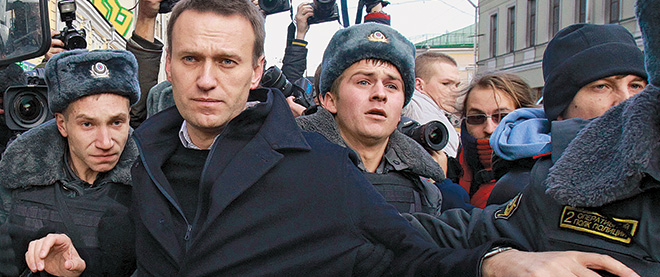The wrinkle in Putin’s facade
Why Alexei Navalny is becoming the Kremlin’s worst nightmare
Sergei Karpukhin / Reuters
Share

Russians who don’t like the way their country is governed by President Vladimir Putin often complain that there is no real alternative to him. For the most part, this view is correct. The Kremlin controls all the levers of state power, and any truly dissident politician is likely to be isolated or expelled.
When the Moscow mayoral election was called in June, there seemed little reason to believe it would be any different than other Russian electoral pantomimes. The incumbent, Sergei Sobyanin, had Putin’s unabashed support, and all the fawning attention of state-friendly media that comes with it. He barely bothered to campaign.
There was a wrinkle when Alexei Navalny, 37, a prominent member of the street protest movement that erupted after 2011 Duma elections that were widely perceived to have been rigged, announced his intention to run. Navalny was convicted of embezzlement in July—in a trial most observers believe was politically motivated—and was only free pending an appeal to a higher court.
According to Maria Lipman, an analyst at the Moscow Center of the Carnegie Endowment for International Peace, Kremlin insiders debated how to deal with Navalny’s bid. Forbidding it risked more street protests, as would blatantly manipulating the results. A fair vote could embarrass Sobyanin, and through him Putin. But with Navalny polling in the single digits when the campaign began, this seemed a safe gamble. It wasn’t. The Kremlin “opened the door a crack,” says Lipman. “Navalny put his shoulder in it.”
The election results earlier this month surprised almost everyone, including those close to Navalny. According to official results, Navalny earned 27.2 per cent of the vote, against 51.4 per cent for Sobyanin, who narrowly avoided a second round of voting by squeaking in above the 50 per cent threshold.
Navalny is disputing the results and demanding a runoff vote, but this is unlikely. If there was manipulation, it was on a much smaller scale than in previous votes—in part due to the thousands of volunteer observers who mobilized to scrutinize the process.
This does not mean the election itself was fair. Security forces harassed Navalny and his campaigners. Media were hostile. “He was mentioned many times, but only to smear him,” says Lipman.
With the game fixed, Navalny and his team played differently. The campaign they rolled out this summer was unlike any other in modern Russia, drawing from hustings in the West and notably from the strategies of U.S. President Barack Obama. “We were really trying to disprove almost all the things that were considered self-evident until then in Russian elections,” says Oleg Kozlovsky, a Russian civil activist who worked on Navalny’s campaign.
Chief among these targeted myths was the assumption that Russians are cynical and apathetic when it comes to politics. The Navalny campaign instead counted on the energy and commitment of crowds. It recruited and used hundreds of volunteers, made aggressive use of social media, received funding from thousands of donors, rather than a few rich tycoons, and staged some 100 public events attended by Navalny himself. Kozlovsky figures Navalny met face to face with 30,000 Russians.
Navalny’s most prominent supporters are the young and educated, but his campaign also made inroads into the ranks of Russian business, drawing public approval from several businessmen in a rare example of establishment members defying Putin.
“Many people are afraid to speak out and support Navalny and other opposition movement leaders, but I think we’re gradually changing that,” says Vladimir Ashurkov, a longtime Navalny strategist who led his business outreach.
And yet, though Navalny did much better than expected, he still lost. Sobyanin remains mayor, and Navalny could soon be on his way to jail.
Ashurkov is upbeat. “The goal was to transform Alexei from a blogger and lawyer and anti-corruption activist into a politician who is playing at the federal level. That we achieved in abundance.”
A year ago, only 10 per cent of Russians had heard of Navalny, says Lipman. Now, three-quarters have. But she says it would require a “gigantic leap” for Navalny to challenge Putin nationally. Putin still has too many means, from friendly media to acquiescent courts, of neutralizing a political rival.
Ilya Ponomarev, a leftist and one of the few Duma members to vocally oppose Putin, works with Navalny, but describes the alliance as tactical.
“Navalny’s a nationalist. He’s a pretty authoritarian type of individual,” Ponomarev said in an interview with Maclean’s this spring. “Essentially, his idea is to replace Putin with a good president, like himself, and eliminate corruption.”
Navalny has mused about running for president. It seems a far-fetched goal now. But then, a few months ago, so did earning the support of one in four voters in Moscow.